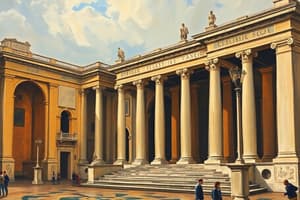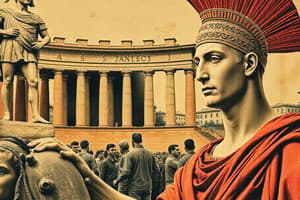Podcast
Questions and Answers
Which emperor is NOT mentioned as a successor to Augustus?
Which emperor is NOT mentioned as a successor to Augustus?
- Marcus Aurelius
- Nerva
- Trajan
- Julius Caesar (correct)
The Roman Peace period lasted for 500 years.
The Roman Peace period lasted for 500 years.
False (B)
At what age could Roman men legally marry?
At what age could Roman men legally marry?
14
Roman families were primarily led by the dominant male figure, known as the ______.
Roman families were primarily led by the dominant male figure, known as the ______.
Match the following emperors with their characteristic contributions:
Match the following emperors with their characteristic contributions:
What event marked a significant slave revolt in Rome?
What event marked a significant slave revolt in Rome?
The living standards in Rome were the same for both wealthy and poor citizens.
The living standards in Rome were the same for both wealthy and poor citizens.
Who led the significant slave revolt in Rome?
Who led the significant slave revolt in Rome?
The __________ was the most popular form of entertainment in Rome.
The __________ was the most popular form of entertainment in Rome.
Match the following living conditions with the corresponding group:
Match the following living conditions with the corresponding group:
What action did Julius Caesar take in response to being removed from command by the Senate?
What action did Julius Caesar take in response to being removed from command by the Senate?
Crassus was known as the richest man in Rome.
Crassus was known as the richest man in Rome.
Who became the first Roman emperor in 27 B.C.?
Who became the first Roman emperor in 27 B.C.?
The mixed culture that arose from Rome's adaptation of Greek culture is called ______.
The mixed culture that arose from Rome's adaptation of Greek culture is called ______.
Match the following leaders with their descriptions:
Match the following leaders with their descriptions:
Which of the following individuals was NOT involved in the formation of the First Triumvirate?
Which of the following individuals was NOT involved in the formation of the First Triumvirate?
Hannibal was a Roman general who led a powerful force against Carthage in the Second Punic War.
Hannibal was a Roman general who led a powerful force against Carthage in the Second Punic War.
What was the primary reason for the downfall of the Roman Republic?
What was the primary reason for the downfall of the Roman Republic?
The Gracchi brothers, Tiberius and Gaius, aimed to address the land crisis by advocating for ______.
The Gracchi brothers, Tiberius and Gaius, aimed to address the land crisis by advocating for ______.
Match the following individuals with their respective contributions:
Match the following individuals with their respective contributions:
What was the primary reason for the 'Struggle of the Orders' in ancient Rome?
What was the primary reason for the 'Struggle of the Orders' in ancient Rome?
The First Punic War was a conflict between Rome and Carthage over control of Sicily.
The First Punic War was a conflict between Rome and Carthage over control of Sicily.
What were the two main social groups in ancient Rome?
What were the two main social groups in ancient Rome?
The First Punic War between Rome and Carthage ended with the Roman victory and the incorporation of ______ into the Roman Empire.
The First Punic War between Rome and Carthage ended with the Roman victory and the incorporation of ______ into the Roman Empire.
Match the following terms with their definitions:
Match the following terms with their definitions:
What was a significant reason for Rome's growth as a trade hub?
What was a significant reason for Rome's growth as a trade hub?
The Greeks had no influence on Italian culture.
The Greeks had no influence on Italian culture.
In what year was Rome declared a republic?
In what year was Rome declared a republic?
The Romans' success was largely due to their sense of ______, courage, and discipline.
The Romans' success was largely due to their sense of ______, courage, and discipline.
Match the following groups to their impact on early Italy:
Match the following groups to their impact on early Italy:
Flashcards
Pax Romana
Pax Romana
A period in Roman history marked by peace and stability, lasting for about 200 years, with emperors like Nerva, Trajan, Hadrian, Antoninus Pius, and Marcus Aurelius.
Roman Father
Roman Father
The dominant male figure in a Roman family, who held authority over his wife, children, and slaves.
Slavery in Roman Society
Slavery in Roman Society
Individuals who were owned by others and forced to work without pay in Roman society.
Greek Language in Roman Education
Greek Language in Roman Education
Signup and view all the flashcards
Roman Girls' Education
Roman Girls' Education
Signup and view all the flashcards
The First Triumvirate
The First Triumvirate
Signup and view all the flashcards
The Second Triumvirate
The Second Triumvirate
Signup and view all the flashcards
Augustus
Augustus
Signup and view all the flashcards
End of the Roman Republic
End of the Roman Republic
Signup and view all the flashcards
Greco-Roman Civilization
Greco-Roman Civilization
Signup and view all the flashcards
Spartacus' Revolt
Spartacus' Revolt
Signup and view all the flashcards
insulae
insulae
Signup and view all the flashcards
Gladiatorial Shows
Gladiatorial Shows
Signup and view all the flashcards
Rome's Population
Rome's Population
Signup and view all the flashcards
Slavery in Rome
Slavery in Rome
Signup and view all the flashcards
Patricians
Patricians
Signup and view all the flashcards
Plebeians
Plebeians
Signup and view all the flashcards
The Struggle of the Orders
The Struggle of the Orders
Signup and view all the flashcards
First Punic War
First Punic War
Signup and view all the flashcards
Second Punic War
Second Punic War
Signup and view all the flashcards
Rome's Location
Rome's Location
Signup and view all the flashcards
Who Were the First Romans?
Who Were the First Romans?
Signup and view all the flashcards
Greek Influence on Rome
Greek Influence on Rome
Signup and view all the flashcards
Rise of the Roman Republic
Rise of the Roman Republic
Signup and view all the flashcards
Early Roman Wars
Early Roman Wars
Signup and view all the flashcards
Hannibal
Hannibal
Signup and view all the flashcards
Roman Republic
Roman Republic
Signup and view all the flashcards
Roman Senate
Roman Senate
Signup and view all the flashcards
Gracchi Brothers
Gracchi Brothers
Signup and view all the flashcards
First Triumvirate
First Triumvirate
Signup and view all the flashcards
Study Notes
Roman Empire Successors
- The successors of Augustus, such as Nerva, Trajan, and Hadrian, failed in several aspects.
- Other emperors such as Antoninus Pius also contributed significantly to the empire, although they struggled to uphold the success of Augustus' reign.
- They were known for Pax Romana, meaning Roman peace, which led to 200 years of peace and stability.
- The Pax Romana saw significant infrastructure projects, including new buildings, bridges, and more.
Roman Family Life and Slavery
- Roman families were structured with the dominant male figure (husband/father) at the head of the household.
- Children of upper-class Romans were taught Greek, while slaves were expected to learn trades.
- Boys were trained to become soldiers and girls were educated.
- Girls were, legally, expected to marry by the age of 16, and men by 12, with those ages eventually becoming flexible.
Studying That Suits You
Use AI to generate personalized quizzes and flashcards to suit your learning preferences.




